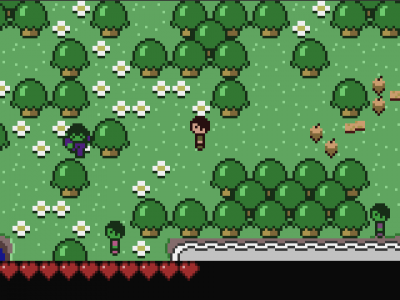
It’s a small thing, but Persson’s Minecraft, which we reviewed today, turned into a rare runaway commercial hit for an indie game and it will be interesting to see if he can do it again.
[aditude-amp id="flyingcarpet" targeting='{"env":"staging","page_type":"article","post_id":367302,"post_type":"story","post_chan":"none","tags":null,"ai":false,"category":"none","all_categories":"games,","session":"D"}']Minicraft draws a lot from Minecraft, in that it involves the collection and use of natural resources to build items. The game looks a little like an early Legend of Zelda title, with its top down perspective, and it offers players a series of island to explore. A simple but addictive approach to resource gathering helps give the game a whimsical charm not a million miles from that of its big brother.
Taking place four times a year, the Ludem Dare (Latin for ‘to give a game’) competition invites entries from solo developers, based around a particular theme. This winter’s theme is ‘Alone’ and the Minicraft game sits comfortably under that umbrella, given that “the goal of the game is to kill the only other sentient being in the world, making sure you’ll be alone forever.”
Minicraft is up against over 700 other competition entries, which cover a multitude of gaming styles and genres. The games will be judged on nine different categories, including innovation, fun, graphics, audio, humor and mood. The winner will be announced on Jan. 9 when the judging period ends.
The winner of the last Ludem Dare competition (#21) was a flash game called ‘Flee Buster’ by ChevyRay Johnston, which combines three different arcade escape games in one.
Alongside the main competition, Ludem Dare also runs a ‘Jam’, a slightly more relaxed affair, which invites teams of developers to come up with games in 72 hours. There are some fantastic entries this year, not least of which is ‘Together Alone’ , a short but sweet puzzle game with more polish than you would think possible, given the time limitation.
There are no physical or cash prizes for the Ludem Dare competition, with the organisers emphasising the fact that “your prize is your product.” Participants are actively encouraged to take their games “above and beyond” the competition, by aiming for inclusion on gaming platforms such as iOS, Android, Steam and major flash gaming sites, such as Kongregate.